Resources
Practice Oriented resources
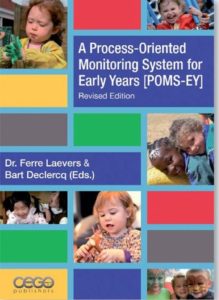 |
Laevers, F., Moons, J. & Declercq, B. (2012). A process oriented child monitoring system for the early years [POMS]. Leuven: CEGO Publishers
In this second, entirely revised edition, we are faithful to the process-oriented emphases, so typical of experiential education (EXE). The key question still remains ‘how is every child doing in the setting?’. The answer is to be found in the assessment of the child’s well being and involvement. They serve as a guide to tailor our practice to the needs and profile of each individual child in the group. That is how we can create the optimal conditions for the development of the huge potentials children are born with.This new edition contains a number of significant improvements, amongst which the insertion of observation scales for nine developmental domains. |
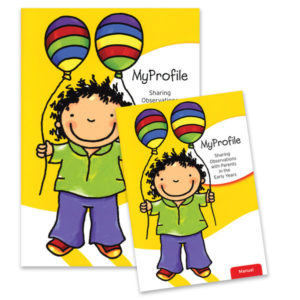 |
Laevers, F., Daems, M., Debruyckere, G., Declercq, B., Silkens, K., Snoeck, G. (2012). MyProfile: sharing observations with parents in the early years. Leuven: CEGO Publishers
MYPROFILE focuses on the individual child, its well-being and involvement, and its development in 9 domains. It summarizes the observations made in the setting in order to share them with parents. That is how it inspires conversations between parents and practitioners, with the child’s well-being and talents at the centre. [Designed for children from 0 to 6 years of age] |
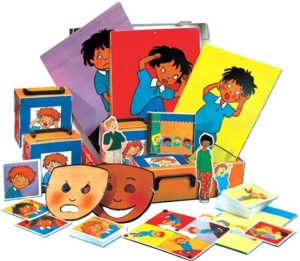 |
Kog, M., Moons, J.& Depondt, L. (2001). A box full of feelings. Leuven: CEGO Publishers.
The ‘BOX FULL OF FEELINGS’ is designed to support the social-emotional development of children aged two to seven. The set is built around four basic feelings: happiness, fear, anger and sadness. It contains the tools to get children involved in more than twenty different activities, all year round. They can be offered in a flexible way: as guided group activities, as optional activities, as part of a separate area for social-emotional development or occasionally as a response to certain events. |
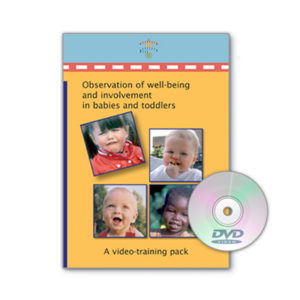 |
Laevers, F., Debruyckere G., Silkens, K. & Snoeck, G. (2005). Observation of well-being and involvement in babies and toddlers. A video-training pack with manual. Leuven: Research Centre for Experiential Education.
This training pack developed for care settings with children from 0 to 3 contains the full description of the scales for well-being and involvement, 20 video excerpts for each of these dimensions, the scores for each of them, an extensive argumentation of them and guidelines for trainers. |
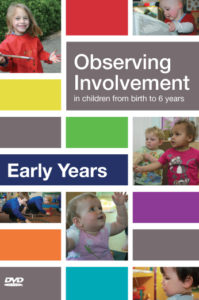 |
Laevers, F., Declercq, B., Marin, C., Moons, J. & Stanton, F.(2010). Observing involvement. The Leuven – Kent Partnership [Early Years Foundation Stage]: a video-training pack. Leuven: Cego Publishers.
One of the key indicators of quality in education is the level of engagement of children. This ‘intrinsically motivated intense mental activity’ or involvement can be regarded as a direct measure of the ‘power of the learning environment we provide’. This training pack consists of 24 clips video-taped in a variety of early years settings in the U.K. (Kent). It is designed for practitioners, advisers and researchers to become confident and reliable observers of the levels of involvement in children between 0 to 6 years of age. These levels provide a solid ground to identify where, when, how and for which children the quality of our approach can be improved. |
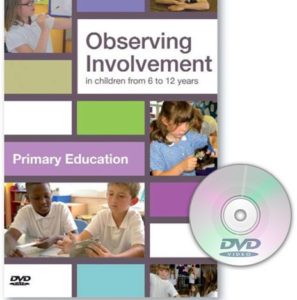 |
Laevers, F., Declercq, B., & Jackaman, S. (2011). Observing involvement. The Leuven – Kent Partnership [Primary Phase]: a video-training pack. Leuven: Cego Publishers.
A series of fifteen video clips shot in everyday learning situations across the spectrum of Primary Education in a variety of settings within Kent. The clips will enable users to familiarize themselves with the Leuven Involvement Scale and evaluate their own assessments. Involvement [intrinsically motivated intense mental activity] can be regarded as a direct measure of the ‘power of the learning environment we provide’. This training pack is designed for teachers, advisers and researchers to become confident and reliable observers of the levels of involvement in children between 6 to 12 years of age. These levels provide a solid ground to identify where, when, how and for which children the quality of our approach can be improved. |
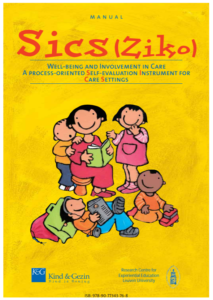 |
Laevers, L., Moons, J., Daems, M., Debruyckere, G., Declercq, B., Silkens, K., Snoeck, G. (2005). SICS (ZIKO).Well-being and involvement in care. A process-oriented self-evaluation instrument for care settings. Brussel: Kind & Gezin.
The process-oriented self-evaluation instrument for care settings (SiCs) is designed to help settings to get aware of their strengths and weaknesses when it comes to create the best possible conditions for children to develop. Although heads of settings or coordinators are collecting most of the data through observation, every supervisor in the settings is actively involved in the procedure of self-assessment. The process of reflection and action is seen as the responsibility of the whole team. Downloads: |
Key references
- Samuelsson, I.P., Sheridan, S., & Williams, P. (2006). Five preschool curricula: comparative perspective, in: International Journal of Early Childhood, 38 (1).
- OECD (2004). Five curriculum outlines.
- Laevers, F. (2011). Experiential Education: Making Care and Education More Effective Through Well-Being and Involvement, in:
- Laevers F, Declercq B. (2018). How well‐being and involvement fit into the commitment
- to children’s rights, in: Eur J Educ., 35, 325–335. https://doi.org/10.1111/ejed.12286
- Laevers, F., & Declercq (2013). Increasing children’s competencies through wellbeing and involvement, in: Reflections Magazine, 52.
- Laevers&Heylen. Involvement of Children and Teacher Style: Insights from an international study on Experiential Education. [Socrates publication]
- Pascal, C., & Bertam, T. (1999). The effective early learning project: The quality of adult engagement in early childhood settings in the UK. [paper presented at EECERA Conference]
- Ferre Laevers (2000) Forward to Basics! Deep‐Level‐Learning and the Experiential Approach, in: Early Years, 20 (2), 20-29. https://doi.org/10.1080/0957514000200203
- Laevers, F., Buyse, E., Willekens, A., Janssen, T. (2011). Promoting language in under 3s. Assessing language development and the quality of adult intervention, in: European Early Childhood Education Research Journal, 19 (2), 269-297. http://dx.doi.org/10.1080/1350293X.2011.574415
- Van Cleynenbreugel, C., De Winter, V., Buyse, E., & Laevers, F. (2011). Understanding the physical world: Teacher and pupil attitudes towards science and technology: An intervention study in primary education.
- Laevers, F. (1993). Deep level learning: an exemplary application on the area of physical knowledge, in: European Early Childhood Education Research Journal, 1 (1), 53 – 68. http://dx.doi.org/10.1080/13502939385207351
- Thys, M. (2016). Open-ended science and technology learning environments: Challenges for pupils, teachers and researchers. [doctoraat Psychologie en Pedagogische wetenschappen, KULeuven]
- Papieska, J., Spilt, J.L., Laevers, F. (2018): A new performancebased measure of children’s socioemotional understanding: Psychometric properties of the domino test for socioemotional understanding (DOTSEMU), in: European Journal of Developmental Psychology. https://doi.org/10.1080/17405629.2018.1512850
- Lenaerts, F., Braeye, S., Nguyen, T.L.H., Dang, T.A., & Vromant, N. (2017). Supporting Teachers in Vietnam to Monitor Preschool Children’s Wellbeing and Involvement in Preschool Classrooms, in: International Journal of Early Childhood, 49 (2), 245-262. https://doi.org/10.1007/s13158-017-0188-2
- Research Centre for Experiential Education – Leuven University (2006). Ten action points: A rating scale for self-evaluation.
- Van der Mespel, S. et. al. (2013). Workbook for childminders: Building on your own capability. Gent, Belgium.
- Lietaert, S. (2016). A gender gap in the classroom? Different perceptions of student engagement and teacher support. [doctoraat Psychologie en Pedagogische wetenschappen, KULeuven]
- Lietaert, S., Roorda, D., Laevers, F., Verschueren, K, & De Fraine, B. (2015). The gender gap in student engagement: The role of teachers’ autonomy support, structure, and involvement, in: British Journal of Educational Psychology, 85, 498–518.
- Laevers, F. (2017). How are children doing in ECEC? Monitoring Quality within a process oriented approach. In: Klinkhammer, N. et. al. (2017). Monitoring Quality in Early Childhood Education and Care: Approaches and experiences from selected countries. Deutsches Jugendinstitut: Department Children and Childcare. https://www.dji.de/fileadmin/user_upload/bibs2017/Monitoring_Sammelband_E_final.pdf
- Laevers, F. (2005). The curriculum as means to raise the quality of early childhood education. Implications for policy, in: European Early Childhood Education Research Journal, 13 (1), 17-29. http://dx.doi.org/10.1080/13502930585209531
